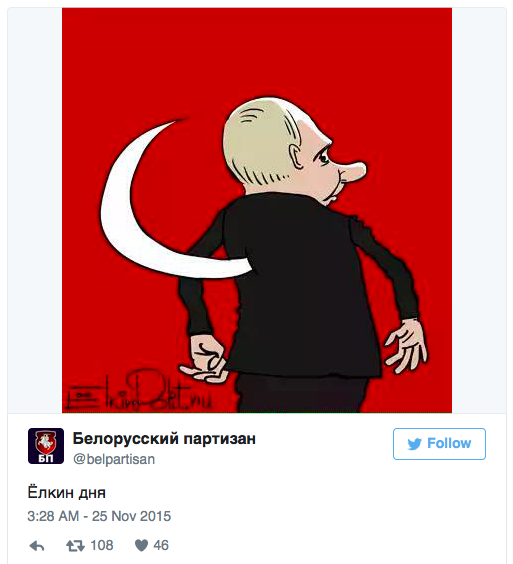By Tom Balmforth | ( RFE/RL) | – –
MOSCOW — Vladimir Putin said there would be “serious consequences” after Turkish fighter jets shot down a Russian warplane on November 24.
True to the Russian president’s word, Moscow has issued a slew of retaliatory measures and proposals following the incident along the Syrian-Turkish border.
The Russian public, too, appears to be seething with anger and jingoistic pride, based on a spate of incidents on the streets and postings on social media.
The Kremlin-funded news outlet RT, floating the hashtag “#StandWithRussia,” proclaimed that “social network users are expressing solidarity with Russia after the crash.”
In Moscow on November 23, an angry crowd of protesters gathered outside the Turkish Embassy, holding signs reading: “We Won’t Forget, We Won’t Forgive” and “Murderers!”
The following day, tempers apparently flared and witnesses said that protesters pelted the embassy building with eggs and stones.
“The Turkish Embassy has been attacked,” tweeted Russian photographer Yevgeny Feldman.
Moscow-based blogger Filipp Kireyev provided video evidence of the damage to the embassy…
… and of the “loads of broken glass and stones” that littered the street outside.
Others, like Washington Post reporter Andrew Roth, made followers aware that anti-Turkish vandalism was not isolated to the capital.
Sergei Elkin, a Russian cartoonist, played off Putin’s angry comment that he felt “stabbed in the back” by Turkey.
Also playing off the president’s comment, the hashtag #ударвспину (stab in the back) was trending. It featured a number of patriotic memes, one of which showed Putin hunting down Turkish President Recep Tayyip Erdogan.
RT addressed some of the ways that Russian social network users were considering “punishing Turkey.” The piece included one social media photo showing Erdogan nervously chewing his tie, a la Mikheil Saakashvili, the former Georgian president who is much reviled in Russia.
There were angry outbursts from Russian officials as well.
Aleksei Pushkov, a State Duma deputy and senior member of Russia’s foreign policy establishment, tweeted that “the actions of Turkey have confirmed its reputation as an unpredictable country that sympathizes with [IS] and Islamists. This is a big blow to Turkey’s image in Europe.”
Even Russian manufacturers got in on the act, with the Russian Association of Textile-makers writing an open letter to the government proposing a national boycott of Turkish clothing.
The association’s letter argued that a boycott would hit Ankara in the pocketbook, because “simple arithmetic” showed that imports from Turkey had reached $7 billion, of which $2.5 billion went to Turkish citizens’ salaries and $400 million to the Turkish state.
Russian passport control officers apparently got in on the act as well, with the Russian press citing the Turkish website www.kokpi.aero as reporting that longtime Turkish residents of Russia had encountered heightened scrutiny of their documents upon arriving on an Istanbul-Moscow flight.
Foreign Minister Sergei Lavrov, meanwhile, cancelled a planned trip to Ankara soon after the fighter jet was shot down on November 24 and then warned Russian citizens against travelling to Turkey at all.
“The critical mass of terrorist incidents on Turkish soil,” he said in televised comments, was “no less of a threat than in Egypt” (where the Islamic State group bombed a Russian airliner full of tourists in October).
He later stressed that the decision was not due to “our vengeance,” saying on November 25 that it was not done “at the spur of the moment and in a state of agitation,” but came after an objective evaluation of the presence of terrorist threats in Turkey.
Major tourist agencies in Russia, meanwhile, suspended the sale of holiday tour packages at the request of the Tourism Ministry, according to the Interfax news agency.
The satirical VKontakte community Lentach mused that Turkish men would be bereft without the flood of Russian women vacationing in their country every year.
“Natasha really isn’t coming back now,” read one caption.
“Where to go now instead of Turkey?” pondered the independent station TV Rain.
Moscow-based journalist Jason Corcoran suggested that the only hope for Russia’s cash-strapped tourist agencies would be to ramp up tours to Crimea, the Ukrainian peninsula annexed by Russia last year.
Via RFE/RL
Copyright (c) 2015. RFE/RL, Inc. Reprinted with the permission of Radio Free Europe/Radio Liberty, 1201 Connecticut Ave NW, Ste 400, Washington DC 20036.




 © 2025 All Rights Reserved
© 2025 All Rights Reserved